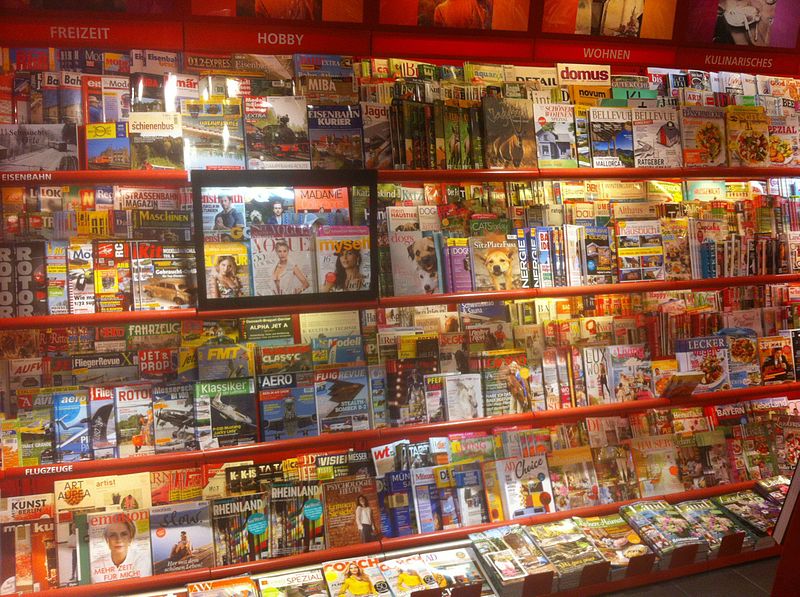I miss magazines
-- Photo by Rudiger Muller
Adapted from Robert Whitcomb's "Digital Diary,'' in GoLocal24.com:
I love print magazines. The way you turn the pages like a book. That the quality national magazines have fine contextual writing, superb photography and other illustration and spiffy design. (Indeed, the position of art director is very important in most magazines.) The way that they’re much more portable and neater than a broadsheet newspaper. And that you look at them with reflected light makes it easier to read long articles in them than reading such text on a screen. Like a book.
The four-color photography, strong design and expensive slick paper have been particularly important in maintaining the popularity of upscale specialty magazines such as for fashion and travel – the major reason that some of those magazines continue to thrive. Ads look their best in such formats.
As a kid I used to look forward to the arrival late each week of a slew of magazines --- Life, Look, Time, Newsweek, The Saturday Evening Post, Business Week, the National Geographic and even for a few years the Illustrated London News (which still ran black and white photos showing the damage done by Nazi bombers in London). These magazines were a joy to peruse.
New England has had more than a few regional magazines, such as the still prosperous Yankee and Down East magazines, but many have folded, such as the very interesting and attractive New England Monthly magazine published in 1984-1990.
When working in New York as an editor at The Wall Street Journal, I wrote for various magazines, usually travel stories but also how-to pieces and spot news, for extra money. While the monthly magazines understandably have relatively leisurely, if far from stress-free production schedules, the weeklies, particularly such news magazines as Life, Look, Time, Newsweek and Business Week, had high-pressure and even bizarre schedules. The first two days of the week were rather relaxed in their high-rise, high-tension headquarters, but the pressure built as the late-Friday deadlines approached. Editors and writers would put in 12-hour-days or more on Thursdays and Fridays.
Once the magazine was “put to bed,’’ after many cigarettes and much coffee had been consumed, there was a very unhealthy, if joyous habit of descending on midtown Manhattan bars to get hammered.
My late friend Harry Anderson, a high-level editor at Newsweek, used to tell me that the staff there did about 75 percent of the week’s work in the last 12 hours before the magazine (or “book’’ as the magazine staffs call it). He died in his forties of a heart attack.
Of course, magazines are fading fast. Google, Facebook, et al., gobble much of the advertising revenue; news can be published instantly on the Internet, and media publishers decide that they don’t want to spend money on paper and physical distribution of their products. So the number of national magazines is falling and virtually all of the surviving ones are much thinner than they used to be.
Some are becoming just Web sites and famous editors, such as the famed Vanity Fair editor Graydon Carter as well as the editors of Time, Elle, and Glamour, have recently been leaving their jobs, not wanting to preside over their publications’ accelerated decline. And Jann Wenner will sell his controlling stake in the often interesting if often irresponsible Rolling Stone.:
Still, it’s hard to think of a more pleasant reading experience than that offered by a good magazine. Let us hope that some of the best will survive, like recreational sailboats after steam ships and the internal-combustion machine came in. But magazines will increasingly be boutique operations and they’ll be harder to find, as I discovered the other week at Books on the Square, in Providence, which has taken away its magazine rack. Very sad.
To read a recent New York Times article on the fading away of magazines, please hit this link:
https://www.nytimes.com/2017/09/23/business/media/the-not-so-glossy-future-of-magazines.html
